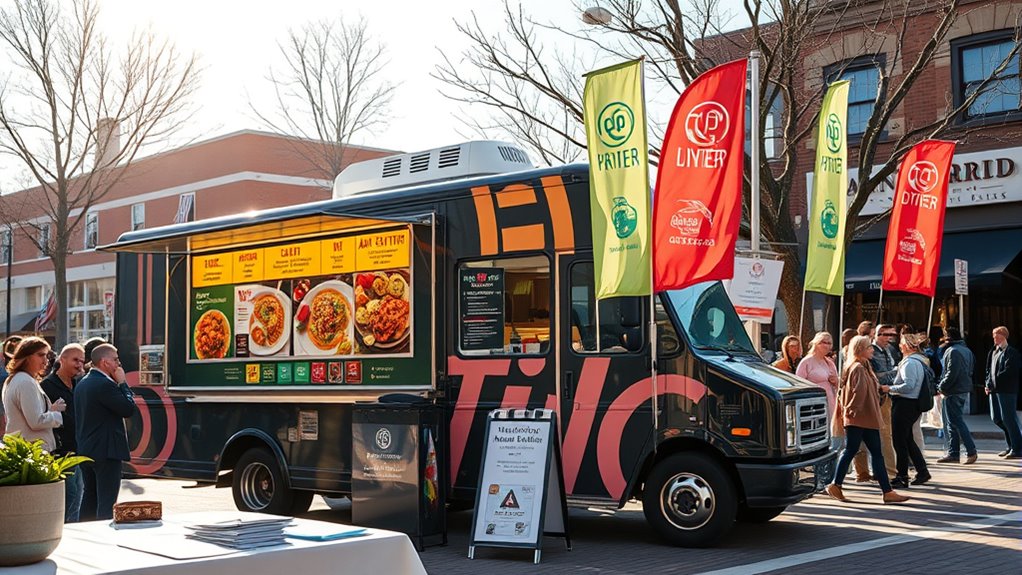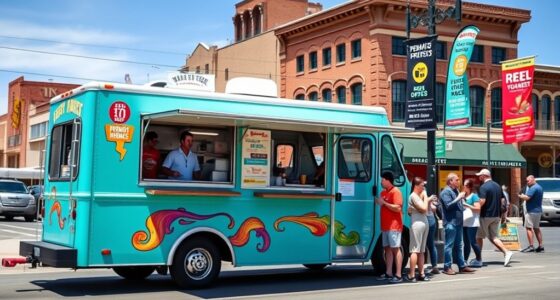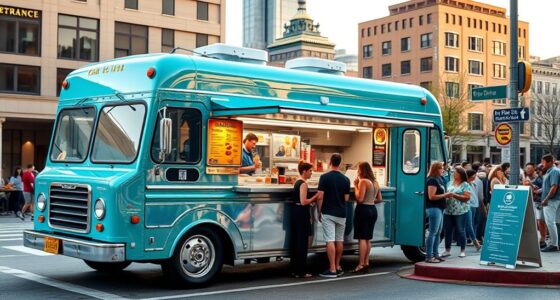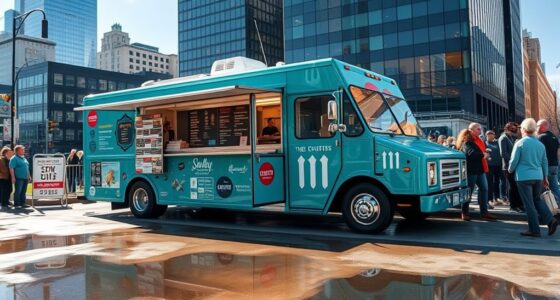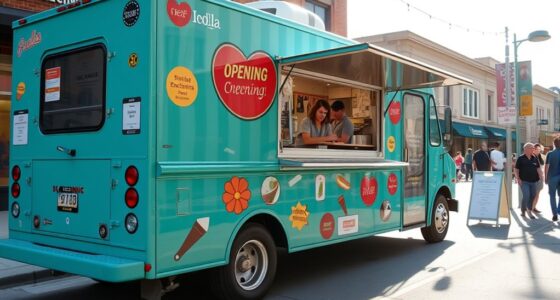To open a food truck in Ann Arbor, you’ll need to secure permits like the STFU license, health, and vending permits, and guarantee compliance with zoning laws. Startup costs vary from $15,000 to $150,000, including equipment, vehicle, and licensing fees. Find busy locations, partner with local vendors for a seasonal menu, and use social media and community events to market your business. Keep up with health standards and permits to stay compliant—more tips follow to help you succeed.
Key Takeaways
- Obtain necessary permits including STFU, Food Service License, and location-specific approvals, ensuring compliance with Ann Arbor health and zoning regulations.
- Budget for truck costs ($15,000–$150,000), equipment, permits (~$197), and monthly expenses like commissary rental and insurance.
- Focus on high foot traffic areas such as downtown, parks, and events; secure permits respecting zoning and seasonal restrictions.
- Develop a compliant menu using locally sourced, seasonal ingredients; submit menus for approval and ensure safety standards are met.
- Leverage social media, participate in local events, and build community engagement to boost visibility and customer loyalty.
Navigating Permits and Licensing in Ann Arbor
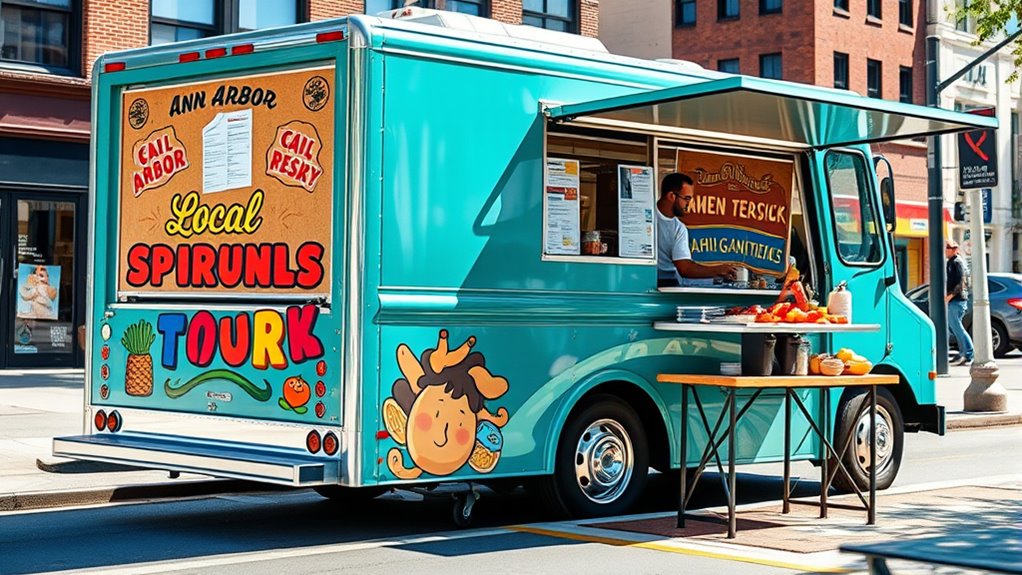
To operate a food truck in Ann Arbor, you need to navigate a series of permits and licenses that guarantee your business complies with local and state regulations. First, you must obtain a Special Transitory Food Unit (STFU) License from the city. You’ll also need a Food Service License from the Michigan Department of Agriculture & Rural Development (MDARD) or your local health department, depending on your operations. If you service from a commissary at least 24 hours, a Mobile Food Establishment License costing around $192 is required, along with a Commissary License if applicable. You might also need a Temporary Food Establishment License for events. Submit all applications at least 30 days before opening, including proof of food safety certification, a detailed menu, photos, and valid business documents. Ensuring your food safety practices meet local standards is essential to maintain compliance and protect customers.
Estimating Startup Expenses for Your Food Truck Venture
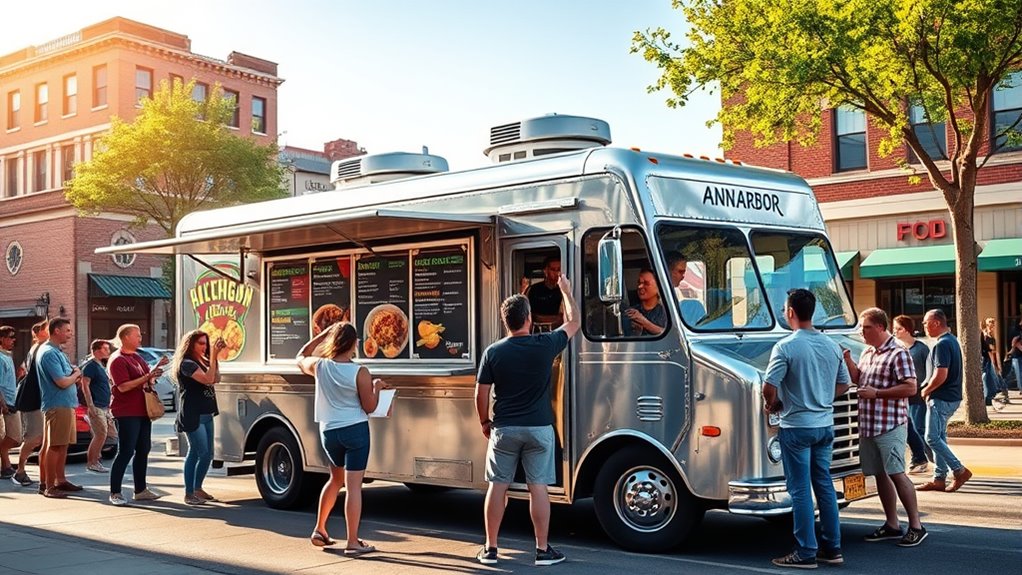
Estimating your startup costs means understanding expenses like licenses, equipment, and operational needs. These costs can add up quickly, especially with licensing fees, truck purchases, and initial inventory. Carefully budgeting for each aspect guarantees you’re prepared to launch your food truck successfully in Ann Arbor. Knowing the specific costs in Ann Arbor, such as permit fees and local regulations, can help you plan more accurately. Additionally, understanding payment technology options and their associated costs can influence your overall budget and operational efficiency.
Licensing and Permits Costs
Starting a food truck in Ann Arbor involves steering through various licensing and permit costs that can considerably impact your startup budget. You’ll need a mobile food establishment license (~$192/year), health permits from Washtenaw County, and city business registration. Additional expenses include sales tax licenses and commissary kitchen fees, which range from $1,000 to $1,500 monthly. Food truck permits and licenses are issued by local health departments and city agencies, often requiring periodic renewals and inspections. You should also budget for permit plan reviews (~$197), temporary event licenses (~$73), and transitory food unit permits (~$159 plus inspections). Renewal fees and special event permits can add to costs. Be prepared for vehicle compliance, parking fees, insurance, and security deposits, all influencing your total investment. Proper planning guarantees you cover all licensing essentials upfront and understand the regulatory requirements for operating legally in your area.
Equipment and Operational Expenses
Wondering how much you’ll need to invest in equipment and supplies for your food truck? The costs vary widely, with a new truck priced between $15,000 and $150,000, and used options costing less. Custom build-outs, including ventilation, plumbing, and cooking stations, can add $20,000 to $80,000. Essential kitchen equipment—grills, fryers, refrigeration, prep tables, sinks—costs $10,000 to $30,000. You’ll also need serveware, utensils, and supplies, which start at $300. Don’t forget vehicle upgrades for Michigan safety and emissions standards, especially for older trucks. Operational expenses include $2,000–$3,000 for initial inventory, ongoing supplies, fuel, maintenance, and commissary rentals around $1,000–$1,500 monthly. Budget wisely to cover these essential startup and operational costs. In addition, equipment needs and power requirements should be carefully assessed based on your menu and operational scale to ensure efficiency and compliance with safety standards.
Finding the Perfect Vending Locations and Zoning Compliance
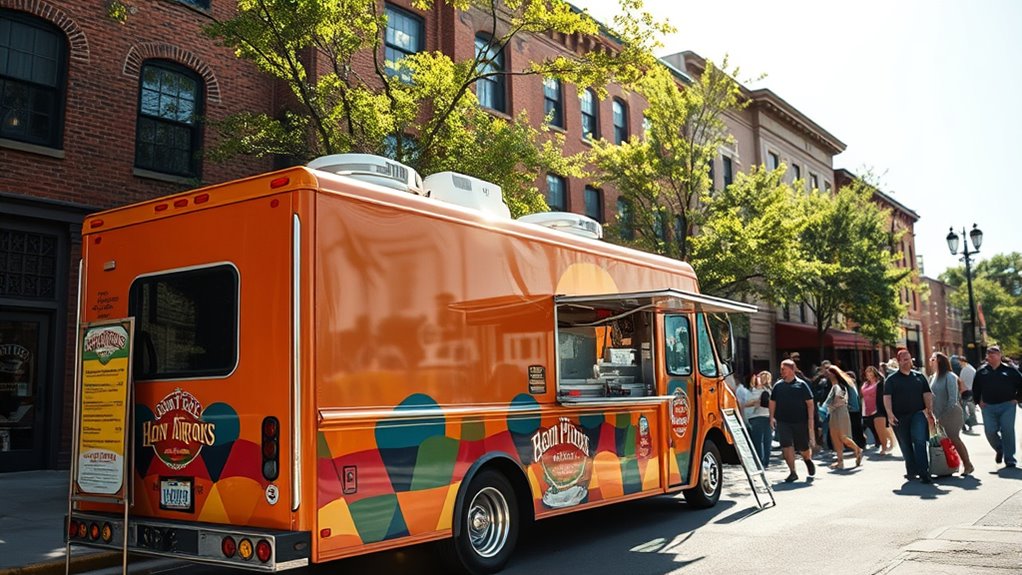
Finding the perfect vending locations in Ann Arbor requires strategic planning and careful attention to zoning laws. You need to identify high foot traffic areas like downtown districts, university campuses, parks, and public markets, which boost sales potential. Partnering with local breweries, coffee shops, or retail stores can open new vending opportunities. Additionally, proximity to office complexes ensures steady lunchtime demand from professionals. Leveraging these popular spots can significantly increase your customer base. To stay compliant, you must secure permits for each location, adhere to zoning codes, and follow health department regulations. Be aware of seasonal restrictions and special event permits. Understanding market rules and respecting neighborhood noise, waste, and parking laws helps maintain good relations and ensures smooth operation. Recognizing building code regulations is essential for legal compliance and safety.
Developing a Locally Sourced and Approved Menu
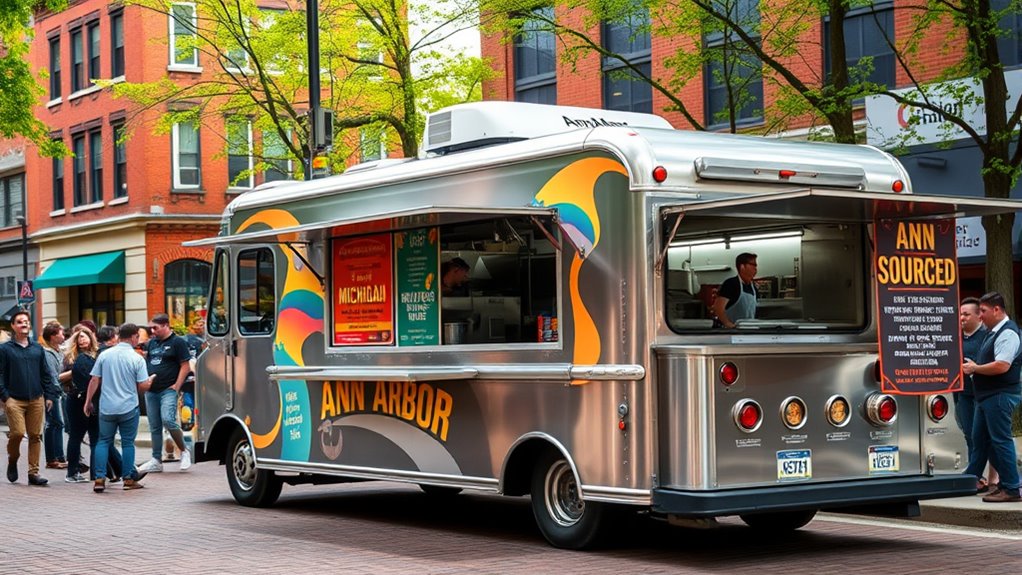
To develop a locally sourced and approved menu, you need to verify ingredient sources and document their origins clearly. You’ll also have to navigate the approval process, including submitting detailed menus and securing certifications from local suppliers. Planning seasonally guarantees your menu stays fresh, compliant, and appealing to health-conscious customers in Ann Arbor. Additionally, ensuring your ingredients meet the city’s health and safety regulations is essential for smooth operations. Checking expiration dates and monitoring for spoilage, such as color changes or mold, helps maintain the quality and safety of your menu items, aligning with food safety standards.
Ingredient Source Verification
Establishing a reliable ingredient source verification process is essential for developing a locally sourced and approved menu. You need to confirm that your suppliers comply with federal, state, and local food safety laws. Wild mushrooms, wild game, and wild fish require specific inspections or approvals—uninspected items are prohibited. Home-canned or cottage foods aren’t allowed in your licensed food truck. When ingredients arrive, inspect them immediately for temperature, freshness, and contamination risks. Ensuring consistent supplier compliance is vital for maintaining food safety standards. Regularly reviewing supplier certifications and staying updated on local regulations can help prevent compliance issues.
Menu Approval Process
How do you guarantee your menu meets all approval requirements before launching? First, submit a complete product list with ingredients and attach menu copies to your application for review by Ann Arbor authorities. Clearly identify any locally sourced ingredients. If you modify your menu during operation, you’ll need to submit updates in writing for approval. Your menu must comply with health and safety codes, prepared in an approved commissary kitchen, and meet Michigan Department of Agriculture standards. Include food photos and a vendor affidavit certifying your products are your own. For events, submit menu details at least 15 days prior, and undergo on-site inspections on the day of the event. Any changes require re-approval to keep your permits valid and avoid suspension. Additionally, ensure your menu has undergone the state health department approval process before launching to guarantee full compliance. Incorporating menu management best practices can help you stay organized and ensure continuous compliance throughout your operation.
Seasonal Ingredient Planning
Planning your menu around seasonal ingredients in Ann Arbor guarantees you deliver fresh, locally sourced dishes that resonate with customers and support local farmers. By aligning your offerings with peak harvest times, you ensure quality and maximize flavor. Use ingredients from Ann Arbor Farmers Market, focusing on produce like asparagus, berries, apples, and root vegetables—depending on the season. Incorporate seasonal herbs and microgreens to elevate dishes and create visual appeal. Adjust menus monthly or quarterly to reflect ingredient availability and maintain freshness. Highlight seasonal specials and story-driven menu items to engage customers. Collaborate with local producers for consistent supply, verify sourcing credentials, and promote your commitment to sustainability. This approach boosts authenticity, appeals to eco-conscious diners, and strengthens your connection to the Ann Arbor community. Understanding local agricultural cycles can help you plan effectively. Tracking these cycles allows for more precise menu planning and reduces waste. Seasonal ingredient planning also encourages creativity in your kitchen, inspiring innovative dishes that showcase peak flavors. Use local herbs and microgreens for flavor and presentation.
Ensuring Health and Safety Standards Are Met
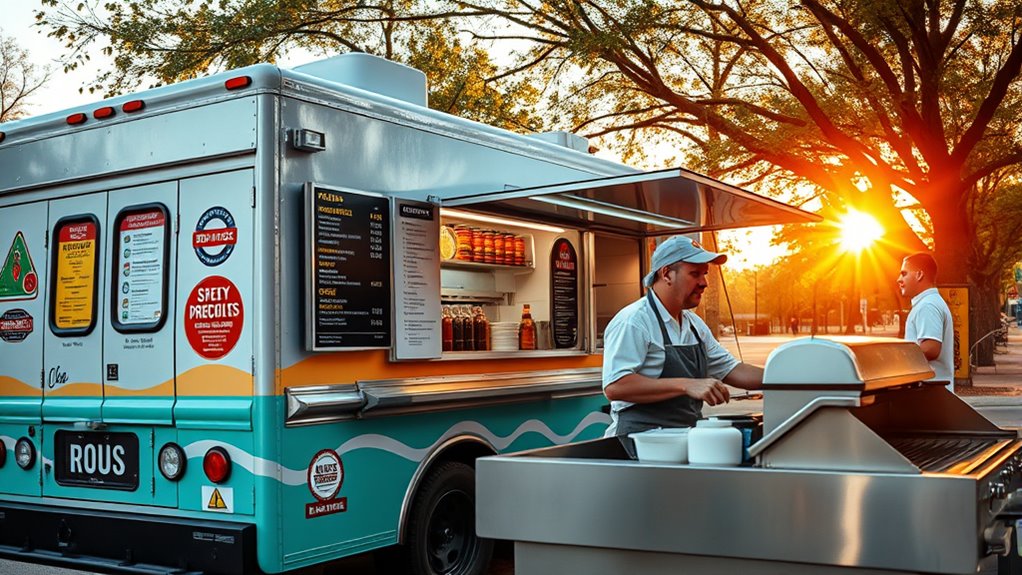
To guarantee your food truck meets health and safety standards in Ann Arbor, you need to understand and comply with licensing, inspection, and safety requirements. First, obtain a Special Transitory Food Unit (STFU) License by submitting an application, proof of a valid business license, food safety certification, and passing a health inspection. Display your ServSafe certification visibly on the truck. You also need a Food Establishment License from MDARD, renewed annually before April 30. Regular health inspections by the Washtenaw County Health Department or MDARD ensure sanitary conditions, proper food handling, and waste disposal. Maintain proper temperature controls, prevent cross-contamination, and ensure handwashing stations are accessible. Food safety regulations are enforced by local health departments to protect public health. Additionally, staying updated on food safety standards can help prevent violations and ensure ongoing compliance. Ultimately, pass fire safety inspections, train staff on emergency procedures, and keep documentation of all inspections visible during operations.
Crafting Effective Marketing Strategies to Grow Your Business
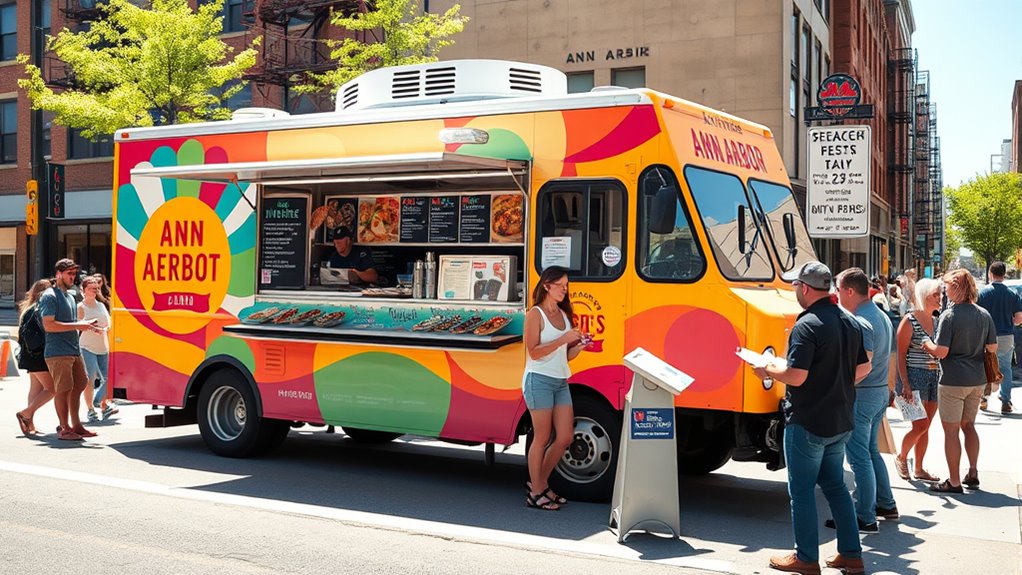
Effective marketing is essential for your food truck’s growth in Ann Arbor, and leveraging the right strategies can markedly boost your visibility and customer base. Social media is a powerful tool; 68% of food truck owners use it regularly, with Facebook being the most popular—used by 75%. Engaging actively can increase customer spending by about 15%, and 40% of customers discover trucks through social media ads. Participating in local events and festivals, which 80% of trucks attend, helps you connect with diverse crowds and build community loyalty. Implementing loyalty programs and email marketing can boost repeat visits by 30%. Additionally, using data analytics and GPS apps improves marketing efficiency and customer targeting, helping your truck stand out in Ann Arbor’s competitive market. Over 24,000 food trucks operate in the United States as of 2023, which underscores the importance of targeted marketing to differentiate your business in a crowded industry. Moreover, understanding the local community and adapting your menu and promotions accordingly can significantly enhance your success.
Frequently Asked Questions
How Long Does the Permit Approval Process Typically Take in Ann Arbor?
You’re probably wondering how long it takes to get your permit approved in Ann Arbor. Usually, the process takes about 2-3 business days once your application is complete, but it can extend up to 10 days or more depending on complexity and inspections needed. Remember, submitting a thorough application and scheduling inspections promptly helps speed things up, so plan ahead to avoid delays.
Are There Any Restrictions on Operating Hours for Food Trucks in the City?
Ever wonder if there are rules on when you can operate your food truck in Ann Arbor? Yes, the city enforces restrictions based on zones and districts. You can’t stay stationary too long in certain areas, especially residential zones, and must follow permitted hours. These rules help balance community peace and traffic flow. Are you prepared to navigate these regulations to keep your operation compliant and successful?
Can I Operate a Food Truck on University Campus Property?
You can operate a food truck on university campus property, but you need to secure the proper permits first. Submit a Food Truck Safety Application at least 7 business days before your event, and get approval from Environment, Health, & Safety (EHS) Fire Safety Services. You also must submit a Notification of Intent for each event and be on the Approved Food Truck Vendors list. Without these permits, you’ll face immediate closure.
What Are Common Reasons for Permit or License Application Rejections?
You might think your permit will be approved easily, but common rejections happen when applications contain false info or incomplete docs. If you overlook health regulations or operate outside approved zones, you’ll face denial. Missing signatures, not showing proof of safety, or violating zoning laws also cause rejection. Plus, a questionable business history or past license issues can block approval. Ensuring accuracy, compliance, and transparency is key to avoiding these pitfalls.
How Often Do Health and Safety Inspections Occur After Initial Approval?
You’ll find that health and safety inspections in Ann Arbor happen regularly after your initial approval. Expect annual inspections for mobile food trucks, with unannounced visits at least once every six months or more if needed. These inspections check your compliance with food safety codes, and violations can lead to immediate corrections or further scrutiny. Staying consistently compliant helps you avoid penalties and keeps your truck operating smoothly.
Conclusion
Starting your food truck in Ann Arbor is like planting a seed—careful planning, permits, and a solid menu nurture it to grow. With the right locations, health standards, and marketing, your venture will flourish. Keep each step in harmony, like a well-tuned orchestra, and watch your business bloom. Stay committed, adapt to challenges, and soon, your food truck will become a vibrant part of the local scene.
